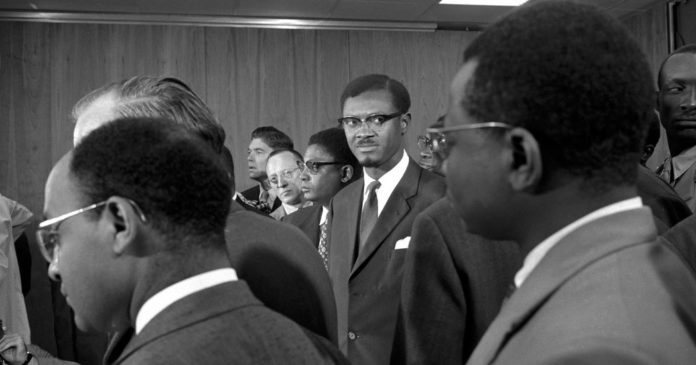BRUSSELS — The Belgian authorities imprisoned Patrice Lumumba as a rabble-rouser. When, shortly afterward, he became the first prime minister of an independent Congo, once their largest and most profitable colony, they supported a military coup that culminated in his killing.
On Saturday, they named a square in Brussels after him.
The former Square du Bastion — which lies near the city’s 14th-century walls, and leads to the Matonge neighborhood, home to a large Congolese diaspora population — became Square Patrice Lumumba 58 years to the day after Mr. Lumumba declared his country’s independence.
The cheering crowds at the ceremony on Saturday, however, masked Belgium’s complex relationship with its former colony. Belgium’s rule over what is now the Democratic Republic of Congo is a sensitive topic here. Most Belgians have at least one ancestor who played some role in colonial-era Congo, and Belgium has officially admitted involvement in Mr. Lumumba’s death.
“By inaugurating this square, we’re not repairing the past, we’re not closing a chapter of history,” said Philippe Close, the mayor of Brussels. “Today, by inaugurating this square, we forget nothing.
“Today, in the heart of the Belgian capital, capital of 500 million Europeans, by inaugurating this Square Patrice Lumumba, we begin to write our common history.”
About 1,000 people were at Saturday’s ceremony, including members of the Congolese community in Brussels, the entire city council, several former government ministers, and relatives of Mr. Lumumba. Around 200,000 people with sub-Saharan roots live in Belgium, experts say, 80,000 of them with links to Congo.
The renaming of the square is Belgium’s latest effort to come to terms with its colonial legacy.
In comparison to his counterparts in Britain and France, King Leopold II of Belgium was a relative latecomer to empire-building, founding Congo as a colony in the late 19th century. He claimed a swathe of territory encompassing the Congo River and its many contributory streams as his personal property.
The monarch extracted enormous amounts of wealth from what came to be known as the Congo Free State, and sent thousands of missionaries to explore and later brutally rule it. Finally, in 1908, he let the Belgian state take control, and Belgium retained it — a territory roughly 80 times the size of its own — until Congo’s independence in 1960.
The full horror of what occurred during the period of Belgian rule, particularly when Congo was personally held by King Leopold II, may never be known. Most historians estimate that up to 5 million lives were lost in that time, roughly a third of the population, though official registers did not exist. Some caution that the number may be over 10 million. Congolese mineral wealth filled Belgium’s coffers.
Nor did Belgian involvement in Congo end when the country won independence in 1960.
As Congo’s prime minister, Mr. Lumumba won a large following at home and elsewhere in Africa through charisma and skillful oratory. He advocated independence, state-led economic development and neutrality in foreign affairs.
But unrest continued in the weeks following independence, and he was soon faced with a coup d’état by the military leader Mobutu Sese Seko. Mr. Mobutu, with the logistical support of both Belgium and the United States, deposed and captured Mr. Lumumba, who was killed in 1961.
The Belgian authorities finally recognized “moral responsibility” for Mr. Lumumba’s death, but only some 50 years later.
Leslie Makoso Kilenda, 23, a member of the Collective for Colonial Memories, one of several associations that campaigned for a memorial site, said in a speech at the ceremony on Saturday that honoring Mr. Lumumba was “noble and righteous.”
It was a necessary step, she added, to begin “ending a Belgo-African history which is trashed by colonial ideology, and which unfortunately still animates many backward opinions in this era of multiculturalism and multiple identities.”
In an interview, Ms. Kilenda, whose parents were born in Congo, added: “It is equally important for the Congolese people and for the memory of a person who was savagely murdered, and didn’t even have the right to his own tomb. Just because he was strong and he was honest. It warms my heart.”
In a sign of Belgium’s difficult relationship with its ex-colony, however, not everyone was pleased with the renaming.
Robert Devriese, a former Belgian diplomat who grew up in Congo, dismissed Mr. Lumumba as a “creation of communism” and attributed violence in Congo during the Belgian colonial period to “a few criminals.”
The Congolese independence leader, Mr. Devriese declared, “did a lot of harm, not just to Belgium, but also to the Congolese.”
Source : Nytimes












